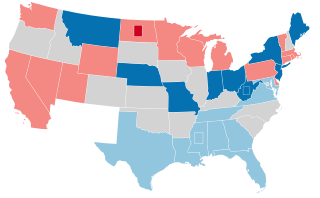
The 1910–11 United States Senate election were held on various dates in various states. As these U.S. Senate elections were prior to the ratification of the Seventeenth Amendment in 1913, senators were primarily chosen by state legislatures. Senators were elected over a wide range of time throughout 1910 and 1911, and a seat may have been filled months late or remained vacant due to legislative deadlock. However, some states had already begun direct elections during this time. Oregon pioneered direct election and experimented with different measures over several years until it succeeded in 1907. Soon after, Nebraska followed suit and laid the foundation for other states to adopt measures reflecting the people's will. By 1912, as many as 29 states elected senators either as nominees of their party's primary or in conjunction with a general election.

United States gubernatorial elections were held on November 5, 2002, in 36 states and two territories. The Republicans won eight seats previously held by the Democrats, as well as the seat previously held by Minnesota governor Jesse Ventura, who was elected on the Reform Party ticket but had since renounced his party affiliation. The Democrats won 10 seats previously held by the Republicans, as well as the seat previously held by Maine governor Angus King, an independent. The elections were held concurrently with the other United States elections of 2002.
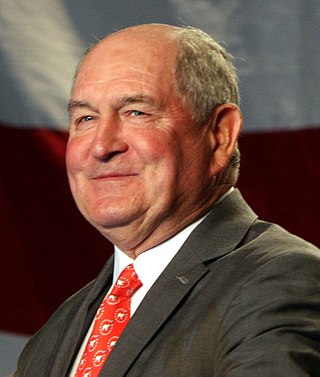
The 2002 Georgia gubernatorial election was held on November 5, 2002. Incumbent Democratic Governor Roy Barnes sought re-election to a second term as governor. State Senator Sonny Perdue emerged as the Republican nominee from a crowded and hotly contested primary, and he faced off against Barnes, who had faced no opponents in his primary election, in the general election. Though Barnes had been nicknamed "King Roy" due to his unique ability to get his legislative priorities passed, he faced a backlash among Georgia voters due to his proposal to change the state flag from its Confederate design.

The 1806–07 United States Senate elections were held on various dates in various states. As these U.S. Senate elections were prior to the ratification of the Seventeenth Amendment in 1913, senators were chosen by state legislatures. Senators were elected over a wide range of time throughout 1806 and 1807, and a seat may have been filled months late or remained vacant due to legislative deadlock. In these elections, terms were up for the senators in Class 3.

United States gubernatorial elections were held on November 8, 2022, in 36 states and three territories. As most governors serve four-year terms, the last regular gubernatorial elections for all but two of the seats took place in 2018 U.S. gubernatorial elections. The gubernatorial elections took place concurrently with several other federal, state, and local elections, as part of the 2022 midterm elections.
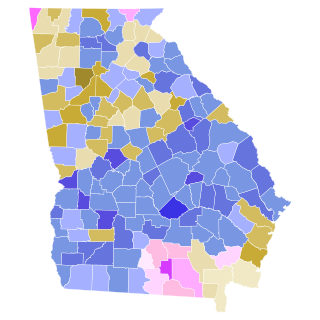
The 1946 Georgia gubernatorial election took place on November 5, 1946, in order to elect the Governor of Georgia.

The 1808 Massachusetts gubernatorial election was held on April 4, 1808.

The 1809 Connecticut gubernatorial election took place on April 10, 1809.

The 1810 Connecticut gubernatorial election took place on April 9, 1810.

The 1802 Virginia gubernatorial election was held on 30 November 1802 in order to elect the Governor of Virginia. Former Democratic-Republican member of the U.S. House of Representatives from Virginia's 12th district and candidate for Governor in the 1797 Virginia gubernatorial election John Page defeated fellow Democratic-Republican candidate and incumbent member of the Virginia House of Delegates from Prince Edward County Abraham B. Venable in a Virginia General Assembly vote.

The 1802 South Carolina gubernatorial election was held on 8 December 1802 in order to elect the Governor of South Carolina. Democratic-Republican candidate and member of the South Carolina House of Representatives from Clarendon District James Burchill Richardson defeated fellow Democratic-Republican candidate and incumbent Lieutenant Governor of South Carolina Richard Winn, as well as Federalist candidate, former Governor of South Carolina and 1796 presidential election Vice Presidential nominee Thomas Pinckney and Democratic-Republican candidate John Gaillard, after receiving a majority of votes in a General Assembly secret ballot vote.

The 1791 Georgia gubernatorial election was held on 8 November 1791 in order to elect the Governor of Georgia. Democratic-Republican nominee and incumbent Governor Edward Telfair won re-election in a Georgia General Assembly vote as he ran unopposed.
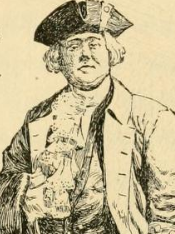
The 1793 Georgia gubernatorial election was held on 6 November 1793 in order to elect the Governor of Georgia. Democratic-Republican candidate and former Governor George Mathews defeated incumbent Democratic-Republican Governor Edward Telfair and fellow Democratic-Republican candidate Jared Irwin in a Georgia General Assembly vote.
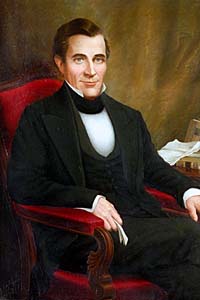
The 1795 Georgia gubernatorial election was held on 14 January 1796 in order to elect the Governor of Georgia. Democratic-Republican nominee Jared Irwin won the election in a Georgia General Assembly vote as he ran unopposed.

The 1802 Georgia gubernatorial special election was held on 3 November 1802 in order to elect the Governor of Georgia following the resignation of Governor Josiah Tattnall due to declining health. Democratic-Republican candidate and former member of the U.S. House of Representatives from Georgia's at-large congressional district John Milledge defeated Federalist candidate and candidate for Governor in 1801 Thomas P. Carnes in a Georgia General Assembly vote.

The 1803 Georgia gubernatorial election was held on 24 November 1803 in order to elect the Governor of Georgia. Incumbent Democratic-Republican Governor John Milledge won re-election against Solomon Wood in a Georgia General Assembly vote.

The 1805 Georgia gubernatorial election was held on 4 November 1805 in order to elect the Governor of Georgia. Incumbent Democratic-Republican Governor John Milledge won re-election in a Georgia General Assembly vote as he ran unopposed.

The 1813 Georgia gubernatorial election was held on 5 November 1813 in order to elect the Governor of Georgia. Democratic-Republican candidate and former member of the U.S. House of Representatives from Georgia's at-large congressional district Peter Early defeated fellow Democratic-Republican candidate John Clark in a Georgia General Assembly vote.

The 1815 Georgia gubernatorial election was held on 20 November 1815 in order to elect the Governor of Georgia. Democratic-Republican candidate and former Governor David Brydie Mitchell defeated fellow Democratic-Republican candidate and incumbent Governor Peter Early, Democratic-Republican candidate and former Governor Jared Irwin and Democratic-Republican candidate John Clark in a Georgia General Assembly vote.

The 1817 Georgia gubernatorial election was held on 10 November 1817 in order to elect the Governor of Georgia. Democratic-Republican candidate and incumbent acting Governor William Rabun defeated fellow Democratic-Republican candidate John Clark in a Georgia General Assembly vote.




















